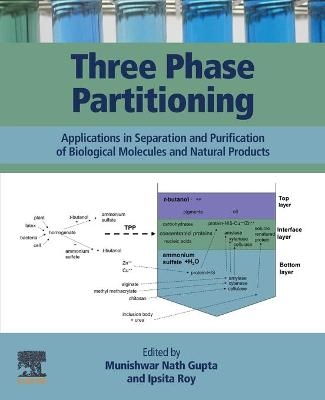
Three Phase Partitioning
Elsevier Science Publishing Co Inc (Verlag)
978-0-12-824418-0 (ISBN)
Dr. Munishwar Nath Gupta earned his PhD from Indian Institute of Science, Bengaluru, and completed post-doctoral positions at Massachusetts Institute of Technology (USA), University of Minnesota (USA), Lund University (Sweden), and University of Technology of Compiegne (France). He has taught chemistry, biochemistry, and biotechnology at Indian Institute of Technology, Delhi, between 1975-2016. He was awarded the National Science Talent fellowship (India) and Fellowships of National Academy of Sciences and Indian National Science Academy. He has edited three books on thermostability of enzymes, non-aqueous enzymology and affinity-based separation methods (published by Springer/Birkhauser). He was an Associate Editor of Biocatalysis and Biotransformation (Taylor and Francis) and founding and former editor-in-chief of Sustainable Chemical Processes (Springer). He’s served on editorial boards of several national and international journals and acted as a consultant to Novozyme (Denmark), Dabur (India), and other international companies. His research interests include applied biocatalysis and interfaces of biochemistry with nanotechnology. Dr. Ipsita Roy earned her PhD from Indian Institute of Technology, Delhi, completed a post-doctoral position at Indian Institute of Technology, Delhi, and conducted an Alexander von Humboldt research fellowship at the University of Bonn (Germany). She has been teaching biotechnology and biochemistry at the postgraduate level at National Institute of Pharmaceutical Education and Research, S.A.S. Nagar, since 2005. Her research interests include stabilization of pharmaceutically important and disease-relevant proteins; aptamer technology; downstream processing of proteins.
1. The origins of Three Phase Partitioning 2. Three Phase Partitioning: How it got applied to areas other than protein concentration and purification 3. The multiple facets of three phase partitioning in the purification, concentration and preservation of proteins 4. Enzymes recovery by Three Phase Partitioning: an overview 5. Emulsion gel formation in three phase partitioning 6. Using three phase partitioning to purify parasite recombinant proteases 7. Partitioning of plant peroxidases by Three Phase Partitioning 8. Process optimization and purification of naringinase and asparaginase enzymes using three phase partitioning (TPP) 9. Macro-[affinity ligand] facilitated three phase partitioning [MLFTPP]. Converting Three Phase Partitioning into an affinity-based process 10. Applications of Three Phase Partitioning and Macro-[affinity ligand] facilitated three phase partitioning (MLFTPP) in protein refolding 11. Three phase partitioning-based strategies for highly efficient separation of bioactive polysaccharides from natural resources 12. Using Three Phase Partitioning to isolate carbohydrates of different molecular weights 13. Technologies for oil extraction from oilseeds and oleaginous microbes: A comprehensive review 14. Three Phase Partitioning as an extraction technique for oleageneous materials 15. Three phase partitioning as a method for isolation of bioactive compounds from plant and animal tissues 16. Three-phase partitioning for simultaneous extraction and purification of biomolecules
| Erscheinungsdatum | 02.08.2021 |
|---|---|
| Zusatzinfo | 30 illustrations (5 in full color); Illustrations |
| Sprache | englisch |
| Maße | 191 x 235 mm |
| Gewicht | 720 g |
| Themenwelt | Naturwissenschaften ► Chemie ► Analytische Chemie |
| ISBN-10 | 0-12-824418-6 / 0128244186 |
| ISBN-13 | 978-0-12-824418-0 / 9780128244180 |
| Zustand | Neuware |
| Informationen gemäß Produktsicherheitsverordnung (GPSR) | |
| Haben Sie eine Frage zum Produkt? |
aus dem Bereich


